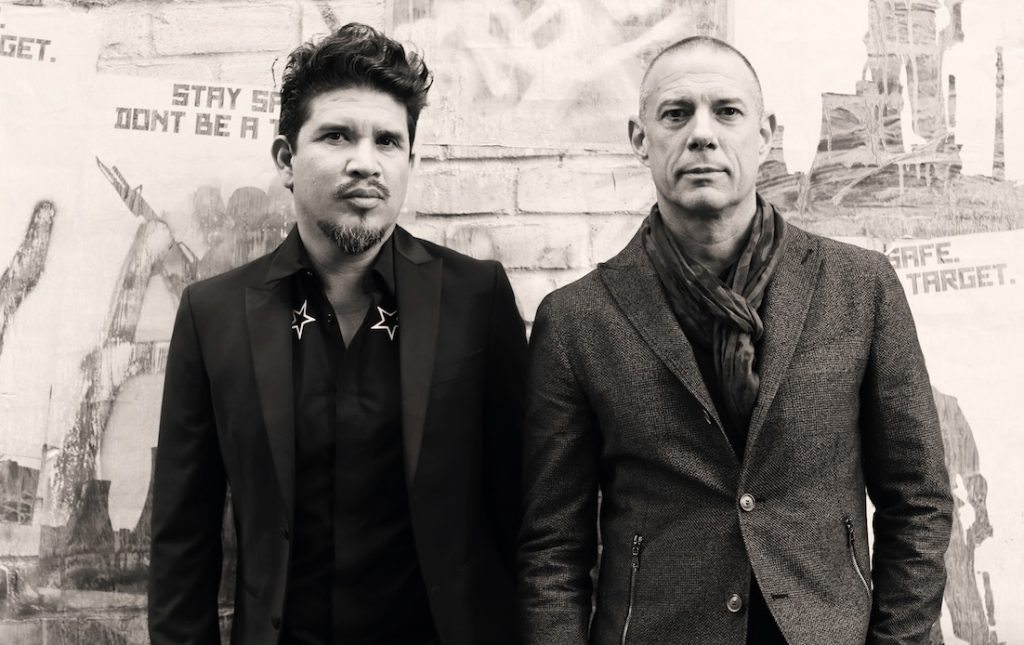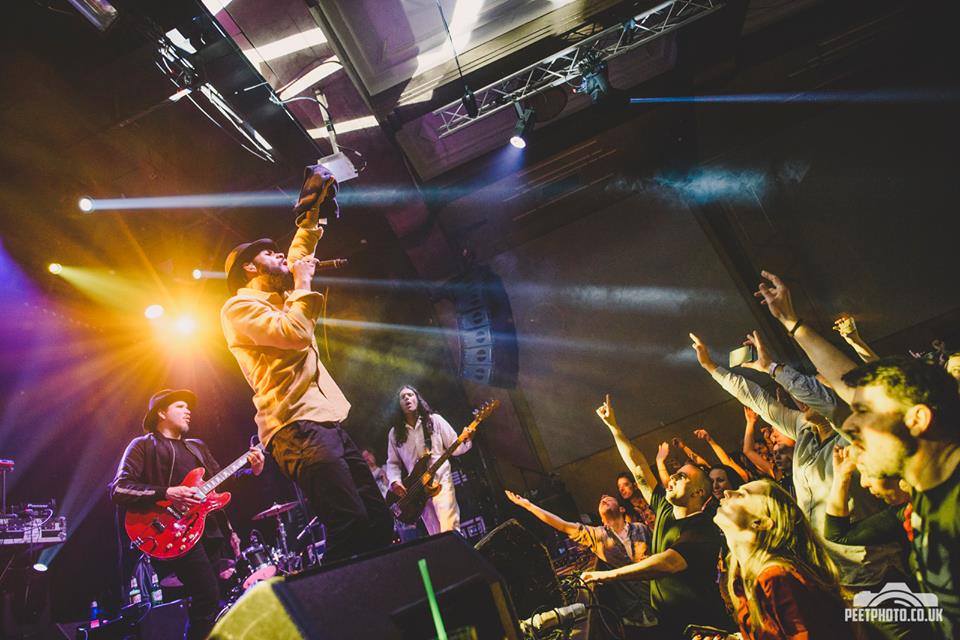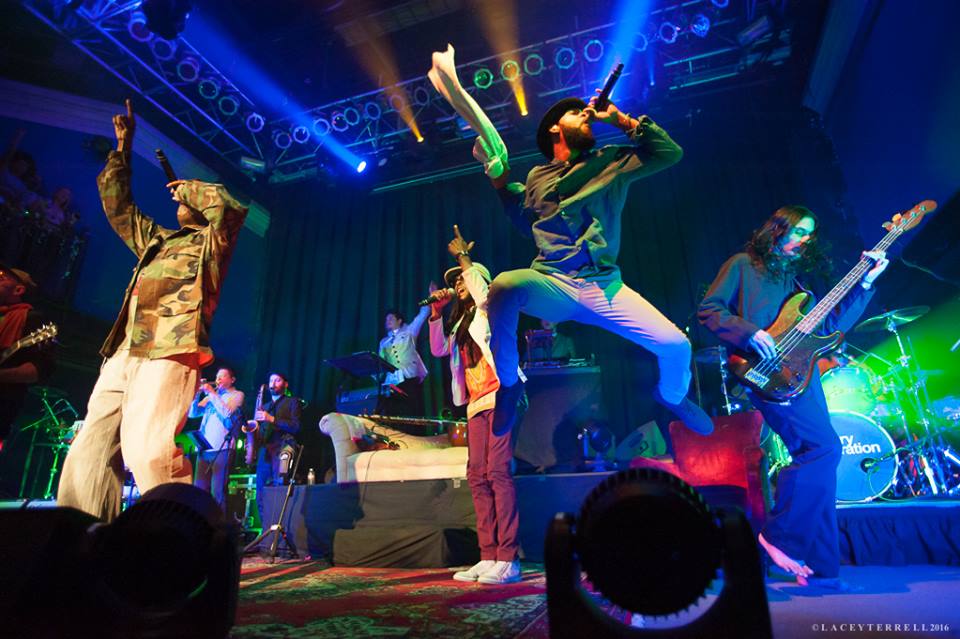
I first discovered Thievery Corporation in the late nineties when I came across a promotional copy of their debut album, 1997’s Sounds from the Thievery Hi-Fi. The cover art featured a fuzzy, close up photo of a stylus on vinyl, pictured through soothing blue hues, suggesting this release might contain trippy, mellow tunes. However, as a long time hardcore fan of roots and dub reggae, what ultimately motivated me to purchase the cd were song titles: “A Warning (Dub),” “2001 Spliff Odyssey,” “Universal Highness,” and “Assault on Babylon.” Little did I know at the time, this debut would launch a career that has now spanned two decades, selling several million albums, performing on five continents, and collaborating with legends such as David Byrne, Perry Farrell, Anushka Shankar, Femi Kuti, and Bebel Gilberto. They accomplished all of this without the support of one radio hit, or any sort of major label backing. This is independent art at its finest.
The genius behind Thievery Corp consists of producers Eric Hilton and Rob Garza, who were drawn together by a mutual love of dub, bossa nova and jazz. Their first record was essentially created with nothing more than some random musical gear and electronic equipment, in the liquor room at Hilton’s Eighteenth Street Lounge in Washington, D.C. While they gained momentum early in their career establishing themselves as masters of downtempo EDM, eventually Thievery’s music would evolve to feature a decidedly more prominent component of reggae, along with the international sounds of samba, hip-hop, electronica, funk, Afro-beat, Indian and Middle Eastern music.
The music also progressed lyrically, with songs that contain social and political commentary. Not surprisingly, Thievery Corp has progressive political views, opposing war and economic exploitation, and championing human rights. Regarding one of their most outspoken albums, 2008’s Radio Retaliation, Rob Garza said, “There’s no excuse for not speaking out at this point, with the suspension of habeas corpus, outsourced torture, illegal wars of aggression, fuel, food, and economic crises. It’s hard to close your eyes and sleep while the world is burning around you. If you are an artist, this is the most essential time to speak up.”
Thievery Corporation has the uncanny ability to create thoroughly relaxing music with arousing, gratifying grooves. Garza and Hilton have translated this intelligently-produced, varied music to a spellbinding live act with an entourage of spirited musicians, including on any given night, a drummer, a percussionist, guitarists, a bassist, a sitar player, a keyboardist, a brass section, and male and female vocalists. During a Thievery performance, listeners can find themselves dreamily floating on a cloud to ethereal chanteuse lullabies and in the next moment feverishly pumping fists into the air to militant ragamuffin sounds and deep reggae beats.
Thievery Corporation headlines Rootfire In The Emerald City this Saturday, July 29 in Seattle, and co-founder, Eric Hilton, was kind enough to speak with us at length about their latest album, their live performances, and more…

Rootfire: Reggae has always been a big part of Thievery Corporation’s music and this latest release, The Temple of I & I, was recorded in Port Antonio, Jamaica. Did Thievery Corp choose to record this “down yard” with a specific production goal in mind? How do you feel recording in Jamaica impacted the overall sound of the album?
Eric Hilton: Initially it was just an excuse to record somewhere interesting, and somewhere warm. I’ve always loved Jamaica. I was on vacation there down at Geejam in Port Antonio and loved it, and loved the studios there. They had a studio and I spent a little time there and I got to know the engineer. Then I called Rob and I said “Hey you know, we should record down here. It’s bitter cold in the U.S. right now, let’s get a couple of the guys and track rhythms here in Jamaica.” So we did that for ten days. Then it kind of became a Jamaican inspired record because, I mean, it only made sense. As soon as we started up in the studio, all we wanted to do was play Jamaican sounds, just because of our environment, and it took off from there.
RF: Thievery Corp played Jungle Jam in Costa Rica in March, which this year had a very reggae-centric lineup, as well as California Roots Festival, in May. With the release of the new record, is the band consciously trying to promote themselves more prominently in the burgeoning reggae scene, or is it the reggae scene finally just catching on to a band that has been creating quality roots and dub music for years?
EH: I think it’s the latter. I think that probably we’re just getting on the radar of people who are primarily in the reggae scene. We’re definitely not a reggae band, obviously, but it is an influence on our sound, and it’s a big influence. I think, you know, people of many different walks kind of like Thievery Corporation. It’s interesting. I mean even in the jam band scene — you know, we do some festivals in that scene — and the jam band fans love us. And honestly, I can’t think of a band that’s more different than a jam band. Our music is pretty structured, made in the studio, we don’t take solos and things like that, but jam band fans really like us. And it’s the same thing with the reggae scene.
RF: Speaking of jam bands, I recall you performing in Chicago the night before the Grateful Dead’s Fare Thee Well concert series – performing some Grateful Dead songs I believe. How did that performance come about?
EH: I actually think it kind of happened by happenstance. I think that we got billed on a festival, I can’t remember which one, that was a little bit jam band-leaning, and we were very well received. And it just kind of went from there. Then the Grateful Dead thing just seemed really bizarre to me because, you know, we are quite different than the Grateful Dead as a musical entity, but it was a great weekend in Chicago. It was a cool opportunity, so we decided to do it, and we ended up actually performing, four Grateful Dead songs, covers. That was really a challenge for us but cool, and a couple of them came out exceptionally well, and we actually recorded one of them which might get released at some point. And it was a great show, people really loved the Dead covers and they loved the show. It’s nice to know that people aren’t completely rigid in their musical tastes.
RF: I recall how excited I was to see you perform for the first time. I was so curious to see how you would translate the recorded music to a live performance and I was sort of expecting something like The Crystal Method or Lo Fidelity Allstars, just some guys twiddling knobs. This couldn’t be farther from the truth. Did you ever foresee Thievery Corp evolving into this type of entity, and did it take a lot of work/practice to get to where you are today with regard to the high level of performance?
EH: We hear that sort of thing. This is going to be a fun question to answer because Thievery Corporation has never rehearsed a live show ever, which is bizarre. We’ve merely thrown personnel at the situation. (Laughs) We started with me and Rob and some electronics, and we didn’t really know what to do. And we kinda, you know, had a singer. We did not pretend to do much, and it wasn’t really working that well, and then we added a few more singers, and we started doing a little bit more. And then we added a live sitar and some guitar players, and then we added a bass player, then horns, then drums, and one by one we just kind of built a band. And every time we brought someone new into the mix, things got better. And that’s just it. We just kind of chose good people and surprisingly they got it from the beginning. They study the songs as they are recorded and they know the changes. Now, of course, they’ve played with us so many times, they know everything. But I never ever in my wildest dreams thought that we would have a live presence, and I’m super thankful that we do. I think Rob is way more into the live show than I am. I just love recording and I love making records. I just wanted to be a producer. I wanted to produce music and I never wanted to be a live performer, even though I was a deejay for many years. But I’m happy that it has worked out this way.
RF: Thievery shows are incredible performances, like a roller coaster ride for your senses and emotions. Do you spend a lot of time crafting the order of the songs, or does the band improvise from show to show?
EH: We definitely think about it quite a bit. I mean it’s pretty easy actually to get a track list together for a live a show. I think we kind of do it the way we would do an album track list. You want to have a certain amount of energy at the beginning of the show, and then you need a bit of a break from it, you need to come down and you need to take a few breaths and do some quieter songs and then you need to build that energy back up. And that’s generally the arc that every Thievery show takes. And then of course if you go into encore you can start mellow and build it back up again. I think the key is just don’t keep doing the same thing all of the time. You don’t want to become predictable and you don’t want to wear out a certain type of sound. You don’t want to do a bunch of heavy stuff and overdo it and you don’t wanna do a bunch of slow stuff and overdo it. You want to do it at the right times.

RF: What is your favorite aspect of performing live?
EH: Well, a couple. My favorite aspect is when we play to fans that clearly know the songs and they are so happy, you can just see it on their face, they’re so happy to hear a certain song, like “Amerimacka,” or “Lebanese Blonde” or something. I mean that’s always just a really gratifying, joyful experience to see that. And then another thing that’s fun is sometimes the mistakes, you know? It’s just kind of funny when the band makes a mistake or something, I mean that tends to make us laugh. We’re never perfect.
RF: The band always seems like they are always enjoying themselves and it’s infectious.
EH: They do.
RF: One of the other things that I love about Thievery shows, at least in New York City where I’ve always seen you perform, is that it’s always such a melting pot of different types of people. It’s as if the crowd really represents the cultural diversity in the music.
EH: It’s possible that just all comes out of where Thievery came from, which is the Eighteenth Street Lounge in Washington D.C., because when that club opened — I opened it with a couple friends of mine — it was sort of a refuge for lots of different types of people, and it really had a very diverse client base, and we kind of prided ourselves on that. Even the staff was really diverse — a lot of people from different countries and different backgrounds — and I think that culture kind of carried over to the ethos of Thievery Corporation as well. We just always found different cultures and the music of different cultures interesting and inspiring to do our own music, so that probably brings a certain fan out to the shows as well.
RF: Could you tell me a little bit about the songwriting process for Thievery Corp?
EH: I think there’s pretty much two different ways that we make songs. The majority of the time we simply work on instrumental tracks that we really really like and at a certain point we make a decision to either keep it instrumental or to develop it into a song with vocals. Like on the last album for instance, “Let the Chalice Blaze” is an instrumental, and it just felt right as an instrumental. But maybe “Letter to the Editor” was a cool music track, but wouldn’t stand alone that well, and so we collaborated with Racquel Jones from Jamaica and that was the magic ingredient. So that’s how we usually approach things. Sometimes, we’ll actually have a song written, and that generally would be Rob more than me — although I have done it as well — for instance, “Richest Man in Babylon” started out as a full lyrical song that Rob wrote and he kinda did a guitar demo for it, and we both really loved the song, so then we just developed music for that song and chose a vocalist. But usually we don’t have our songs written ahead of time. Usually we just kinda vibe out, create instrumental tracks and go from there.
RF: How do you typically discover new music?
EH: Well, I’ve definitely consumed a lot of music in my life. Our brains are like tape recorders, so I think you just sort of file away stuff that you find really inspiring and interesting and then try to combine it together when it makes sense. What we do is, I mean, we make new music and that’s great, but it’s all based on older music. It is thievery, all music making in a way is thievery, whether one will admit it or not. But it’s about doing it your own way, doing it different. It’s funny, lately I don’t listen to as much music as I used to listen to. (Laughing) I don’t know if that’s going to be a permanent thing, or if it’s just temporary. Maybe it’s just from coming off making the album, that’s some heavy experiences listening to each song maybe two or three hundred times as you’re making it. I am always inspired to make music though. I would do it every day if I could.
RF: Thievery has always been about incorporating diverse musical styles and presenting an international sound. Do you ever see yourselves incorporating something different, say soca, or cumbia?
EH: Well, I remember as we were doing The Temple of I & I, I tried to incorporate this kind of old calypso sound in one song, but it just didn’t sound right for Thievery. I love 60s Trinidadian calypso, the horn arrangements and everything are just so beautiful and the lyrics are just hilarious, so that’s a musical style that I really love. I love 60s Caribbean music in general, like from Jamaica, I love rock steady and things like that. Actually, on the latest album, the rock steady track, kinda rock steady slash lovers rock, the last track, “Drop Your Guns,” that one seemed like a stretch for Thievery in a way, but in a way it’s one of my favorite songs on the record. It’s very vintage sounding. It doesn’t sound like something Thievery would have done ten years ago but we are opening up our boundaries a little bit. You might hear a little bit of straight ahead electronic rock from us in the near future, maybe a little bit, you never know.
RF: Interesting, because I would never think that Thievery Corporation has any boundaries at all.
EH: We don’t, it’s just a matter of pushing them at the right time. It’s interesting. There’s a right time for everything. But you’re right, there are no boundaries.
Speaking of the future and a lack of boundaries, Rob Garza perfectly explains what Thievery Corporation is all about: “What inspires us to continue to create this genre of sound is the broad spectrum of collaborators and audience members it continues to draw. We have been extremely privileged to work with artists of all cultural, social and political backgrounds, and our fans display even greater diversity and age differences. The people who have come together through Thievery Corporation are as much an accomplishment as the music we’ve produced to date and will continue to produce in the coming years.”
Please join us in welcoming Thievery Corporation to Rootfire In The Emerald City, this Saturday, July 29 at Marymoor Park in Seattle!
[gravityform id=”36″ title=”false” description=”true”]
